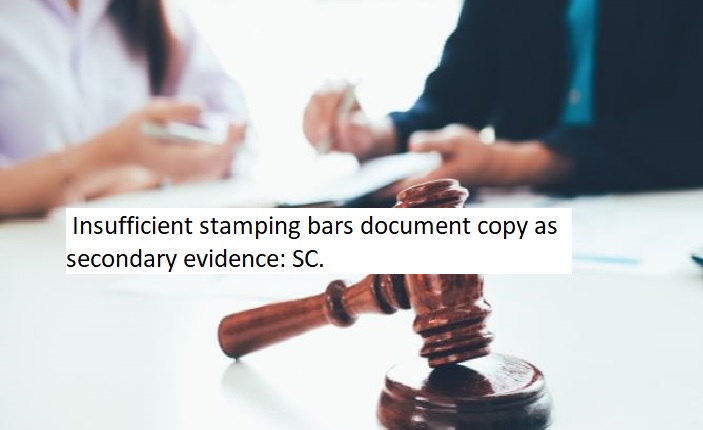


On November 29, 2023, the Supreme Court of India reiterated a crucial legal principle regarding the admissibility of documents as secondary evidence. The bench, comprising Justice Abhay S Oka and Justice Sanjay Karol, emphasized the significance of proper stamping on documents that are legally required to bear it.
The central tenet of the court's reaffirmation is rooted in the principle that if a document mandated to be stamped lacks sufficient stamping, any copy derived from it cannot be accepted as secondary evidence. This legal stance aims to uphold the integrity of documentation procedures and emphasizes the importance of adhering to statutory requirements.
The legal precedent invoked by the bench draws upon a catena of decisions, indicating a consistent judicial approach in this matter. The term "catena of decisions" refers to a chain or series of legal judgments that collectively contribute to establishing and reinforcing a particular legal principle. In this context, the Supreme Court, through various past decisions, has established and reiterated the requirement for documents to be adequately stamped for their admissibility as evidence.
The bench's observation underscores the consequential nature of insufficient stamping on documents. The stamping of a document is not merely a procedural formality but a legal obligation, and failure to comply with this obligation has repercussions on the document's status as evidence. The court's stance reaffirms the principle that legal requirements, including stamping, are not arbitrary formalities but integral components of a robust legal framework.
By specifically addressing the admissibility of document copies as secondary evidence, the Supreme Court addresses a common legal scenario. In situations where the original document is either lost or inaccessible, a party may seek to introduce a copy as secondary evidence. However, the court's position serves as a reminder that even in such cases, the foundational requirement of proper stamping cannot be overlooked.
The choice of language by the bench is deliberate and impactful. The use of terms such as "not sufficiently stamped" clearly delineates the threshold that documents must meet to be considered legally valid. This linguistic precision in legal pronouncements is essential for practitioners, litigants, and the judiciary to interpret and apply the law accurately.
The bench's reliance on past decisions indicates a jurisprudential consistency, reinforcing the court's commitment to established legal principles. Judicial decisions form a coherent body of law, and when a court refers to a catena of decisions, it signifies a conscious effort to align with precedent and contribute to the evolution of legal doctrine.
In conclusion, the Supreme Court's reiteration of the principle that insufficiently stamped documents cannot serve as secondary evidence is a significant reaffirmation of a fundamental legal requirement. This pronouncement emphasizes the court's commitment to upholding legal procedures and underscores the pivotal role of stamping in ensuring the authenticity and admissibility of documents in legal proceedings. The decision serves as a guide for legal practitioners, setting a clear standard for the admissibility of documents and reinforcing the importance of compliance with statutory obligations in the realm of legal documentation.
TAGS: Supreme Court November 29 2023 Secondary evidence Justice Abhay S Oka Justice Sanjay Karol Document stamping .